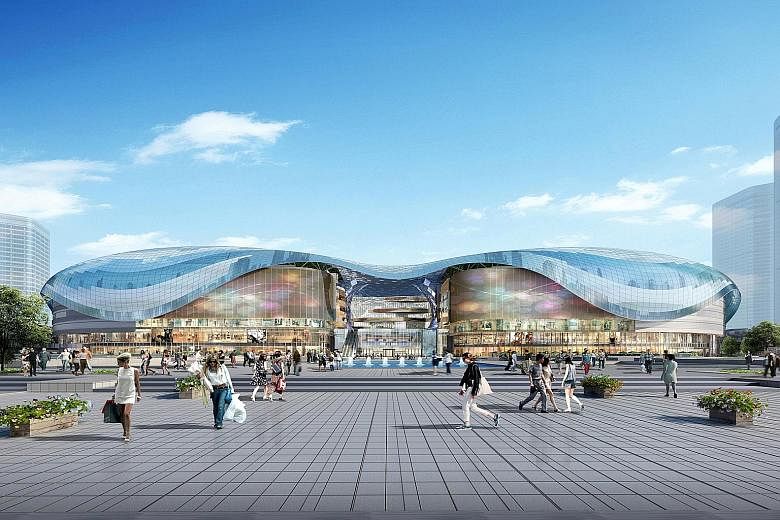A slowdown in Chinese economic growth has not fazed Singapore property developer CapitaLand, which expects record home sales for its mainland projects this year.
Tenants at its malls in China have been notching up improved sales of about 9 per cent year on year.
"We are still confident about China... The key thing underpinning our optimism in China is urbanisation trends and its large (population). Even at about 6 to 7 per cent economic growth, China has good prospects for real estate over the next 10 to 20 years," CapitaLand China chief executive Lucas Loh said. He was speaking on Monday at a presentation during a trip to visit some of its properties there.
China accounts for about $21.4 billion or 46 per cent of the group's total assets - more than the $17.4 billion or 37 per cent in Singapore.
The company is comfortable if this proportion goes up to 50 per cent, said president and group chief executive officer Lim Ming Yan.
CapitaLand's business is focused on Tier 1 and Tier 2 cities in five clusters: Beijing-Tianjin; Shanghai-Ningbo-Hangzhou-Suzhou; Guangdong- Shenzhen; Chengdu-Chongqing; and Wuhan. It had racked up about 6,492 units or 11.6 billion yuan (S$2.6 billion) in home sales at the end of the third quarter and could hit about 8,000 units or about 14 billion yuan by the year end, a record for the company, said Mr Loh.
It aims to drive return on equity (ROE) for its homes by tapping into trends, including the recent liberalisation of capital markets, he said. For example, it is considering issuing onshore corporate bonds.
Other major Chinese developers have been doing so with attractive interest rates of mostly about 4.25 to 4.5 per cent a year, he noted.
Other ROE drivers include enhancing project execution by, for example, managing costs. "Residential pricing growth rate has slowed down, so (we are focusing) on project execution to maintain project margins we have set for ourselves," said Mr Loh.
Replenishing the land bank is also key, although the company noted that prices have run up by as much as 30 per cent year on year in Tier 1 cities, according to recent tenders.
Even as CapitaLand focuses on Tier 1 and major Tier 2 cities for residential sites, "it will be increasingly more competitive with many local developers refocusing their strategy back to these cities... having experienced difficulties in Tier 2, 3 or 4 cities in the past few years", he said.
Projects which have delivered better margins tend to be on land acquired through joint ventures, or mergers and acquisitions - which it will aim to do again. Urban renewal sites are also possible, such as its Datansha Island project in Guangzhou.
The company has also racked up a tidy slate of malls in China, having opened about 54, with 10 more on the way. Sales growth by tenants has been in the high single digits across all tiers of cities, said Mr Chan Kong Leong, CapitaLand Mall Asia head of regional investment, asset and fund management.
It could reconstitute its mall portfolio - as in CapitaLand Mall Trust's (CMT) acquisition of Bedok Mall last month, or CMT's sale of Rivervale Mall to a third party - especially as the group looks to focus on the five city clusters, though that depends on whether the opportunity is there.
Chinese mall operators have also been attempting to integrate online with offline, with partnerships announced this year between Intime and Alibaba, as well as Parkson and Dianping.com. Mr Chan said its malls will stay competitive as it engages shoppers online with platforms such as WeChat and its CapitaStar rewards programme. The group is also aiming to cross-sell products online eventually.
CapitaLand has several more Raffles City projects lined up till 2018, with phased openings of two developments in Hangzhou and Changning scheduled for next year. Oversupply is an issue in some cities. Raffles City Hangzhou is in a new central business district with three Grade A office projects handing over this half year. But Mr Loh said the firm is committed to holding its more premium prices for some offices it is strata-selling.
"While there are many office buildings, there is only one Raffles City... With the completion of the mall next year, and the leasing of the office building that we are keeping for the long term, that will enhance traffic and confidence. Eventually, the strata units will be able to find buyers at the pricing we want."
CapitaLand's serviced residence arm Ascott has been scaling up in China as well. It owns and manages 80 properties with more than 14,300 serviced residences there, and is set to meet its target of 20,000 units by 2020, said Ascott North Asia managing director Kevin Goh. Alliances, such as its joint venture with online apartment-sharing platform Tujia.com this year, will help growth. Since listing its Chinese properties in September, Ascott's revenue from the site has been doubling monthly, he said.
Mr Lim said, as a whole, the group is happy with the group's progress towards ROE targets of 8 to 12 per cent over the next few years. This is achievable for stabilised investment properties and trading properties, which can generally give that level of return - ROE can be double-digit for the Chinese residential market, for example, although the Singapore residential market has been more challenging.
"China is going through a major transformation and moving towards a service-oriented economy... Tier 1 and upper Tier 2 cities will continue to benefit from urbanisation trends which will create demand for real estate," he said.
"CapitaLand is in a unique position given our presence here, our understanding and team of people on the ground... It puts us in a strong position to ride the growth."


